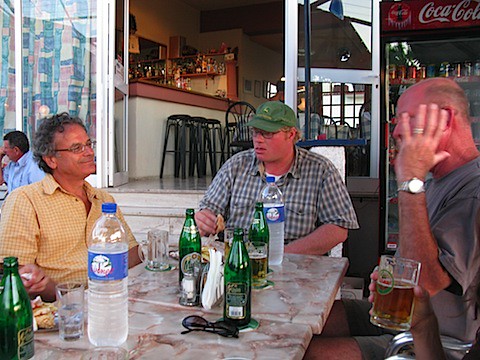I just finished reading Anthony Bourdain's wonderful book, "Kitchen Confidential" that describes his life in the world of cooking and his take on being a professional cook. Given his interest in straightforward hardwork and dedication to the craft of food, his words are inspirational for anyone who strives to be a professional. Bourdain is honest - he knows he doesn't have what it takes to be a 3-star chef. There are culinary geniuses out there that Bourdain recognizes and reveres, but he doesn't count himself as one of them. Bourdain greatness is not in poofy, foamy, arty stuff - but honest good food (the ingredients (the nasty bits), the mechanics and the tastes). This is what makes him what he is: integrity, demand for honest work, and insistence on a good product. He takes no prisoners in this approach and doesn't suffer fools easily. It's a great read.
It occurred to me as I read the book that what Bourdain was describing was a work ethic that resonates well with anyone striving for professionalism. As an advisor of students, most of my work is to get them to work towards the high mark of professionalism. This doesn't mean I necessarily expect them to reach that point - hell, they are students and thus learning (and making mistakes) is part of the process of becoming a professional. That's the point of being in an educational program -- to learn how to be a professional. My job is to demand this standard - consistently - and to provide feedback as to how what may be currently a pile of crap can be transformed/reworked/amended/restarted/scraped/changed into something that is a professional product. And this doesn't apply to just writing a paper - but to learning how to think like a professional, talk like a professional, dress and act like one. On the thinking end of things, one must demand critically sharp logic. When speaking or writing, choose one's words carefully and make sure they mean the same thing every time you use them. These kinds of lessons are basically the bread and butter of being a professor - what makes students turn from slouchy mumblers with a glint of potential, into polished scientists capable of rendering any problem into a series of logically related concepts and solutions.
In one of the latter chapters of Kitchen Confidential, Bourdain writes about a commencement address he would give (or perhaps has given) to culinary students upon graduation. The points he lists are remarkably applicable to graduate students. With recognition of Bourdain's initial formulation, I list them here modified to address the basic principles of professionalism for archaeology students wanting to enter graduate school.
1. Be fully committed.
If you are not fully committed to becoming a professional archaeologist and keeping your eye on that goal, just pack it in right now and get an MBA, learn genetics, or take up programming. Don't even think about starting graduate school in archaeology if you are instantly repulsed by the idea of sitting in a crappy classroom at 2:30AM on a thursday night measuring projectile point lengths for the 50th time to generate error terms while your bank account hovers near zero, your debt climbs faster than the kudzu, your partner hasn't seen you in 6 months, your car has 12 parking tickets and the paper you need to work on and submit by monday is still a glimmer in your brain. This is what will happen - count on it. The lucky (and by no means smarter or more talented) few who get scholarships and the like don't always become the best archaeologists. If its too easy, it probably is. If you aren't struggling to change the way you think and do work, then the program you are in sucks. Pack your bags and find and leave immediately. Find another program. The fact is that anyone taught that archaeology is easy or that we are just "dangerously close to science" doesn't deserve to teach archaeology. We are talking about the science if history here, man! It had better be damn hard if we as a species can manipulate the basic elements of matter and yet have failed at building a science of our own fate. It's certainly not for the lack of trying. So if your brain isnt spinning for the first decade of studying this stuff - you just aren't being taught well. Suffering in graduate school isn't about suffering per se - but about committing your life to becoming a professional. Lots of things that you once believed were necessary or essential (friends, money, good food, leisure time, new wardrobes, vacations) will be stripped away. Now this doesn't mean that one must take a life of a monk to be a professional in archaeology - it just means that when you need to do something, you will be completely, utterly, absolutely committed to doing it.
2. Learn to write, speak and think.
Don't assume that because you were able to squeak good grades out of your papers in undergraduate that you know how to write. Also, don't assume because you can order chicken from a car window, that you can speak. Same goes for believing that are a critical thinker because you think you are smarter than the average bear: everyone believes that so it can't true. Committing to becoming a professional means that you need to start taking writing, speaking and think very seriously. Your ability to do these things is directly related to your ability to being a professional. Do poorly at any one these things, and you might as well pack it in.
All three of these skills are obviously linked. But being able to do one doesn't mean that you can automatically do the others. And you can't skimp on any of them. Attempting to discuss issues with speaking skills that are filled with "uhs, ums" and ad hoc statements will quickly get you ignored. Don't even think about using the word "like" in your sentences. Speak in full sentences - have those sentences form full thoughts that are linked together. The same goes for writing. All of this about building up your logic skills. Learn to take a premise and then break it down. What must necessarily be true if the statement you or someone else has just said is to be believed? Are statements and assumptions logically connected? If not, why? Treat everything you write as a geometric proof. Assume nothing - be explicit. Define your terms.
Reading how to write is a good first step. I recommend Zinseer's book: "On Writing Well". Practice a lot. Practice writing out your ideas. Practice talking with your colleagues. Practice, practice, practice until logic in your writing, speaking and thinking is second nature.
3. Be open, sharing and honest.
In academia, ideas form the basic currency. One might imagine that hoarding ideas might be a good practice in order to "protect" one's assets. Nothing can be further from the truth. Ideas have no value unless shared. Share your thoughts, schemes and ideas. Once you are learning to think you should find yourself overwhelmed with ideas about dimensions of problems that you think you can resolve. Share those -- surely you don't have enough lifetimes to do it all yourself? Create a community of ideas around yourself with your friends and colleagues. The interchange is more valuable than the ideas themselves and the greater they are shared the greater the value. Good ideas are always those that are shared.
I have met graduate students and colleagues who walk around tight-lipped about what they are up to and who are afraid to share their work for fear of someone "scooping" them or perhaps demonstrating why what they are doing is wrong. Dumb-asses, all of them and of very marginal value as colleagues.
At the same time, be honest about where your ideas come from. If you've talked some idea over with a friend, be sure to recognize them. Reference your sources, identify those that share your ideas. While counter-intuitive to the "hoarding" folks, this kind of attribution only strengthens the value of the ideas since these notions aren't something that come of out left-field -but are part of emerging community consensus about the topic. Attribute folks to a fault!
4. Deliver what you have promised on time.
As a student, this is especially important. Don't let your advisor down by not following through on what you have said you would do. This wastes everyone's time and starts a reputation for yourself as being one of those students that talk big, but cannot finish anything. This is not a reputation you want to have since it will follow you throughout your career and will close doors to opportunities you didn't even know you had. If people feel that you are never able to turn a chapter in on time, what's the chance of getting invited to contribute to a volume? While the late papers and incompletes you are doing in graduate school might seem like a minor thing, they are most certainly not. Commit and do what it takes to get your work done.
5. Never make excuses or blame others.
If you screw up, just own up to it. Nobody remembers the occasional mistakes of the person that owned up to them and corrected the error. The person that tries to make his mistake someone else's fault will eventually gain a reputation as being a slippery and untrustworthy character. These folks are the worst because they infect organizations with mediocrity and make others work harder to pull up the slack. Ultimately, no one cares who created a problem -- all that matters is fixing it and preventing it for the next time. If there is a problem, take responsibility for it even if you think it wasn't your fault. Don't wait to point the finger - be the one who is one step ahead.
6. Never call in sick.
Commitment means that you take your work seriously and will do whatever it take to get it done. Unless blood is pouring down your face, get your work done. And if blood is pouring down your face, get some stitches so you can return to getting your work accomplished.
7. Lazy, sloppy and slow are bad.
Becoming a professional means that you take everything you do seriously and the point is creating a solid, meaningful product not just getting the work done. Those who see archaeology as simply a means to an end are not committed to what this is all about. Commitment means that you take whatever step necessary to make sure what you produce is really what you say it is. This means independent measurements.. lots of independent measurements. This mean development strategies for evaluating your work as you are doing it rather than piling it up and hoping that you generated what you think you generated. Be careful and deliberate in your recording of information - make everything you do instantly understandable by other people. Do not drop out details. Record everything.
As for slow being bad - I mean that in the sense of get stuff done. Generate your data and get it summarized and into some analysis as soon as you possibly can - sooner even. Never let things linger or put off doing what you need to do until "some other day."
8. Be prepared to witness every variety of human folly and injustice.
People are sometimes very bizarre and when you're thrown into a pressure-filled situation weird things happen. Graduate school is filled with freakish people and even freakier faculty. Field, lab and class situations can mix together every sort of individual in remote, difficult or crazy locations. Be ready for this and don't get sucked into the personal ego battles. Keep focused on why you are doing what you are doing: to learn how to be a professional. Don't whine about how some individual is being paid more than you though with less experience, Don't go on about your need to get your turn on some piece of equipment. Who cares? Focus on whatever you are doing and do the best possible job at doing it.
9. Assume the worst.
Bourdain warns that you must be careful to not let this seemingly negative outlook poison you. You need to think of this piece of advice as developing the ability to realistically calibrate your expectations of people and situations so that when things get messed up you aren't so surprised that you can't function effectively. Be ready to deal with broken computers, fail lab results, exploding printers, crazy colleagues, demented faculty and the like. These are just the cost of doing business.
10. Avoid advisors who insist on being first authors on papers they do with students.
Faculty who have tenure should be in the game to promote their students not promote their own, increasingly crappy, work. Faculty who continue to publish first author articles that are based on student work think far to highly of themselves and not highly enough for their own students. Who cares if some senior faculty adds another article on to their resume consisting of 140 entries? What difference does that make to anyone other than the advisor's ego? A student, on the other hand, really benefits from the article AND the association with the supposedly big name advisor.
You might even want to extend this point by avoiding advisor's who are pre-tenured altogether. Usually they are so focused on their own success they will have little time for students other than using them to generate results to pad their resumes. They also typically have no experience being an advisor and will likely have no idea what to do. Pick an advisor who has experience and has produced quality students that you can evaluate. Forget the newbies until they ripen a little more.
11. Think about that resume!
Everything you do should somehow be adding to your resume. Figure out how to take class papers and projects and turn them into something you can present at a local meeting (or national! thing big!) or produce as a published paper. Jump at every opportunity to gain experience whether paid or unpaid. Too many students cannot see that the plethora of instruments, talent, knowledge and projects that are available at most universities are a treasure chest to plunder. Don't expect to get paid - do everything for your future. Learn everything, get experience in as many dimensions as possible. Volunteer. Do whatever it takes to get involved in as many projects as possible.
12. Read!
While this point might see obvious, it is something that many graduate students forget: they read the required reading and then stop there. No matter how massive a reading list or bibliography might be, the volume of archaeological literature that is available for any topic is nearly inconceivably large. Never stop with the required readings -- what are the readings upon which those readings are based? What has happened since the articles were published?
Subscribe to the table of contents services for every journal you can think of - go far beyond archaeology journals and look at science, engineering, evolution, biology, genetics, material science and so on. All of these disciplines intersect archaeology one way or the other - and you need to know about them. In fact, most of the best literature out there isn't published in archaeology - in fact it rarely is: most stuff archaeologists do is crap. So, never stop exploring - be a master of everything. Use RSS lists to keep track. Send interesting things you find to your colleagues - trust they will do the same.
Don't just look at the titles, too. READ the articles you collect. Set aside a chunk of time everyday where you read. Never stop reading.
13. Never stop learning.
One can always spot the archaeologist who has just given up and simply rehashing the same old shit -- they've stopped learning and are no longer able to generate new ideas or conceive of the world in ways other than the way they were taught back in their graduate career. These folks are relics - useful reminders of ideas of the past and perhaps repositories of once-current method and concepts. But they are effectively dead. Now this doesn't mean that you should leap onto whatever archaeological bandwagon happens to be passing by -- the majority of them are rickety death traps driven by hucksters and carpet baggers. Your learning should build on what you know (assuming you had good graduate training in the first place and actually learned something useful). Keep adding to your knowledge, challenging your ideas and looking for inspiration. This is the mark of the professional - never satisfied with the product and always looking for improvement.
14. Don't forget to have fun.
Being professional doesn't mean being dour and overly earnest. In fact, folks who confuse dour and earnestness with professionalism are some of the saddest cases of academics I've ever seen. The SAA meetings are chock full of these folks - solemnly carrying their slide deck around with furrowed brows and steadfast determinism. It's almost as if that they believe that if they take themselves really seriously, then everyone else will too. This is usually a bad sign - the ideas may be serious, but you don't have to be. In fact, being serious tends to inversely correlate with serious ideas. I mean, how can one possibly get all worked up about research claiming that small s
hallow pits are excavated by children while deeper ones are excavated by adults?
So, have fun - take your work seriously, not yourself.
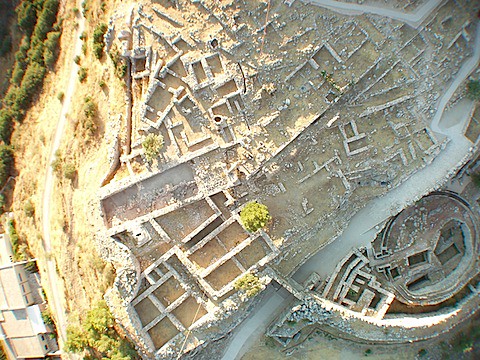
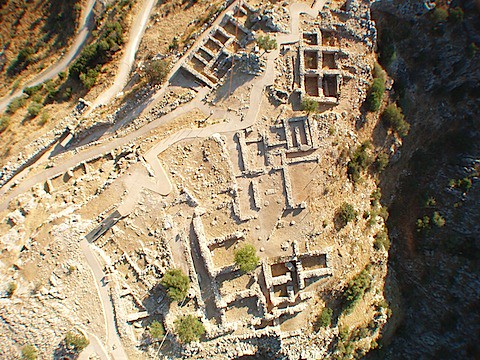
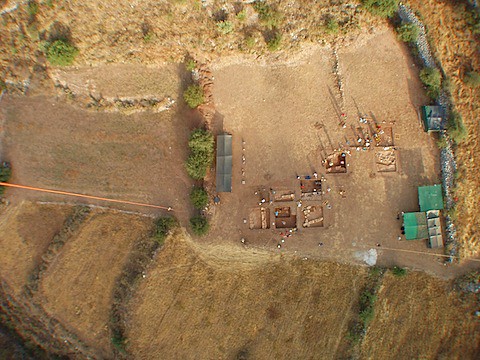
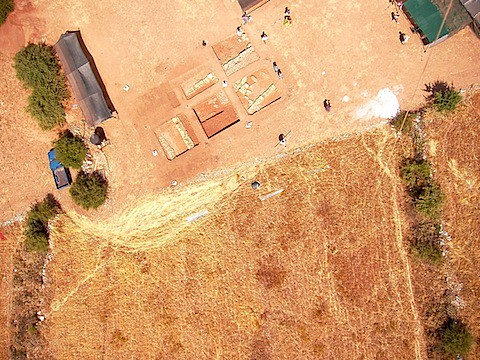
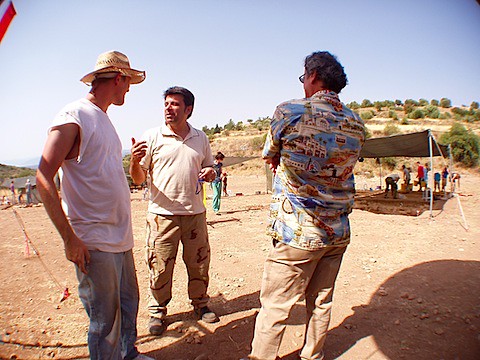

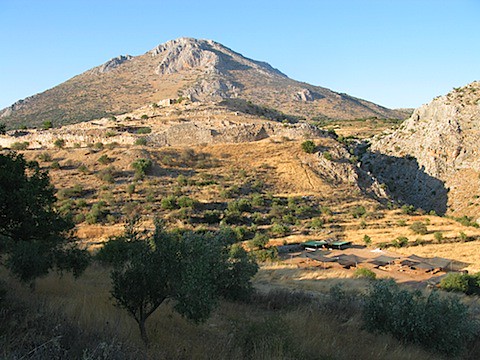 View of Mycenae acropolis and the new "lower town" excavations below.
View of Mycenae acropolis and the new "lower town" excavations below.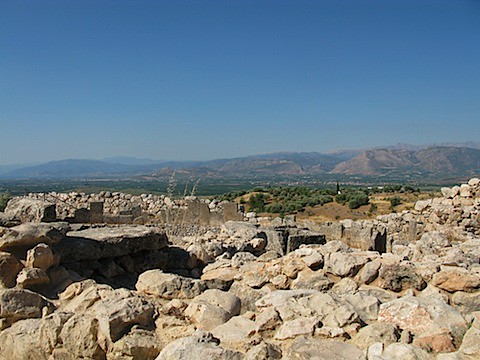 View across the plains...
View across the plains...